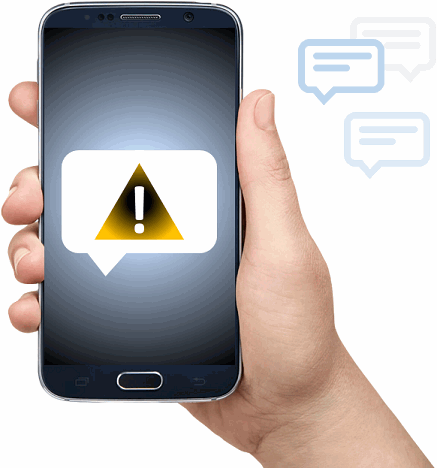Over the past few days my mobile operator sent me several SMS messages recommending the basic preventive actions against COVID-19: wash your hands frequently, avoid visiting crowded places, wear a facemask. SMS is really effective broadcasting public health emergency alerts and warnings, probably more effective than any other communication channel, including e-mail, ads, IM. Let's see why.

Why SMS?
First of all, nowadays virtually everybody has a mobile, while not everybody watches TV, reads the news, browses the social networks. All mobile phones, even the oldest models, are able to receive text SMS messages. The operator can allow all users to receive SMS free of charge, even if having zero balance. If the mobile is out of coverage or turned off the operator can queue the SMS and deliver it later. This is done by the SMS Center (SMSC). Therefore, in terms of coverage the SMS is very close to 100%.
Another advantage is that the operator can target specific groups of users. For example, when the subscriber attaches to the network abroad the operator handles the roaming service. Therefore, the operator knows which subscribers were abroad, in which countries, when and for how long. Therefore, the operator can send the alerts to the recent travelers. The same is applicable within the home country thanks to the location registry (for more technical information check our article about the LOCI).
Cell Broadcast
Let's summarize a related subject. Cell Broadcast (CBC) is an alternative technology, similar to SMS. It is typically used to broadcast very urgent alerts, related to earthquakes, tsunami, ...
CBC is generally available in GSM networks, including 2G, 3G, 4G LTE and 5G standards. Technically CBC is not the same as SMS, it's a different channel. The main difference is that SMS targets a specific user, while CBC targets all users in a specific area.
If the goal is to cumminicate something as soon as possible to as many users as possible, then CBC is the perfect channel. On the ther hand, SMS is delivered to each user one by one. That's why it takes longer to target a large number of users. However, it is more reliable because each SMS delivery can be tracked individually.
Sometimes CBC is disabled in the mobile phone. The users block CBC to save battery or to avoid spam, because some operators abuse the CBC channel to deliver unsolicited messages. That's another reason why SMS is more effective than CBC for public health alerts.


